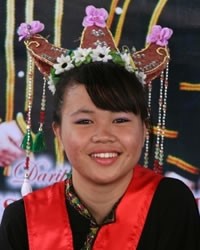Bisaya, Sabah in Malaysia

Photo Source:
MySabah.com
Used with permission
|
Send Joshua Project a map of this people group.
|
| People Name: | Bisaya, Sabah |
| Country: | Malaysia |
| 10/40 Window: | Yes |
| Population: | 81,000 |
| World Population: | 96,000 |
| Primary Language: | Bisaya, Sabah |
| Primary Religion: | Islam |
| Christian Adherents: | 0.00 % |
| Evangelicals: | 0.00 % |
| Scripture: | Portions |
| Ministry Resources: | No |
| Jesus Film: | No |
| Audio Recordings: | Yes |
| People Cluster: | Borneo-Kalimantan |
| Affinity Bloc: | Malay Peoples |
| Progress Level: |
|
Introduction / History
The Bisaya of Malaysia are located in western Sabah along the northern coast of Brunei Bay and also in northern Sarawak along the rivers which flow into Brunei Bay. Inhabiting the middle reaches of the Limbang River, they are often called "people of the middle" or "people of the river".
The Bisayan culture and language are quite similar to that of the Sabah Dusun and related groups in Brunei and Sarawak. In fact, some believe that the culture area should be labeled Bisaya-Dusun. The Bisayan language, Sabah Bisaya, is a part of the North Indonesian branch of the Austronesian language family.
The Bisaya in Malaysia live among the much larger Malay groups. However, local Malays are important to the Bisaya, as they supply them with buffalo, boats, seafood and Malay medicines. Although they have borrowed some customs from surrounding peoples, the Muslim Bisaya remain culturally unique.
What Are Their Lives Like?
The Bisaya are primarily farmers, with rice being their staple crop. They grow chilies, maize, cucumbers, pumpkins, eggplant and other vegetables. Fruit trees provide bananas, coconuts and breadfruit. Fish is another important part of the Bisaya diet, as is the meat from wild pigs, deer and pheasants. Women gather plants and jungle products for food, medicines, resin and other supplies.
Bisaya villages are located along river banks, and each has a number of rice granaries. True Bisaya villages consist of permanent settlements of two or more houses, one of which is a "long house." These rectangular structures are built on piles 10-15 feet above the ground. Each has a veranda for receiving guests and performing major ceremonies. Each long house also includes four or more apartments for family members.
The family members of a long house share house repairs, observe the same taboos, and share major rituals; however, in no other way do they act as a corporate group. On the other hand, the close-knit family members living in each apartment pool resources and share a common hearth, rituals, and prayers for crops.
First marriages among the Bisaya are usually arranged by the parents when the children are very young. Although polygyny (having multiple wives) exists among the wealthy, most men marry only one woman. Upon marrying, a couple moves either to the same apartment as one of their parents or to an apartment of a close kinsman in the same house as the parents. Only after the birth of the first child may a couple live in their own apartment. Divorces are obtained easily by both sexes, and the children of a divorce have a choice between parents.
The Bisaya celebrate various ceremonies throughout the year. The major agricultural ceremony is the harvest temorok, in which the wealthy contribute large amounts of food. The makan selamat is a health feast shared with the Malays as a preventive measure or as a thanksgiving feast at the ending of an epidemic.
What Are Their Beliefs?
Most Bisaya are Muslims, adhering to traditional Islamic practices and beliefs. Theirs is a religion of works based on the belief in one god, Allah. Their religious duties include praying five times a day, fasting, and giving alms to the poor.
Some of the Bisaya are animists, believing that non-human objects have spirits. Spirits of the dead are thought to appear at certain public ceremonies, and river spirits, tiger spirits, and sky spirits are also a part of their belief system. The dukun, or herbalist-curer, acts as a witch doctor. A spirit medium uses trances at public ceremonies to cure people. The Bisaya believe that disease is caused by "soul loss", and it is the spirit medium's job to retrieve that soul. They believe that souls of the dead go to one of seven villages that are located behind the sun.
What Are Their Needs?
The Bisaya have few Christian resources available to them, and most of them have never had an opportunity to hear the gospel. There is a real need for Bible resources to be translated into their language. Prayer and further evangelism will be required to win the Bisaya to Christ.
Prayer Points
Ask the Lord of the harvest to send missionaries who will invest their lives in the Bisaya of Malaysia.
Ask the Holy Spirit to grant wisdom and favor to anyone who will take Christ to the Bisaya community.
Pray for the Holy Spirit to give Bisaya family leaders dreams and visions of the Lord.
Ask God to raise prayer teams who will begin daily intercession for the Bisaya.